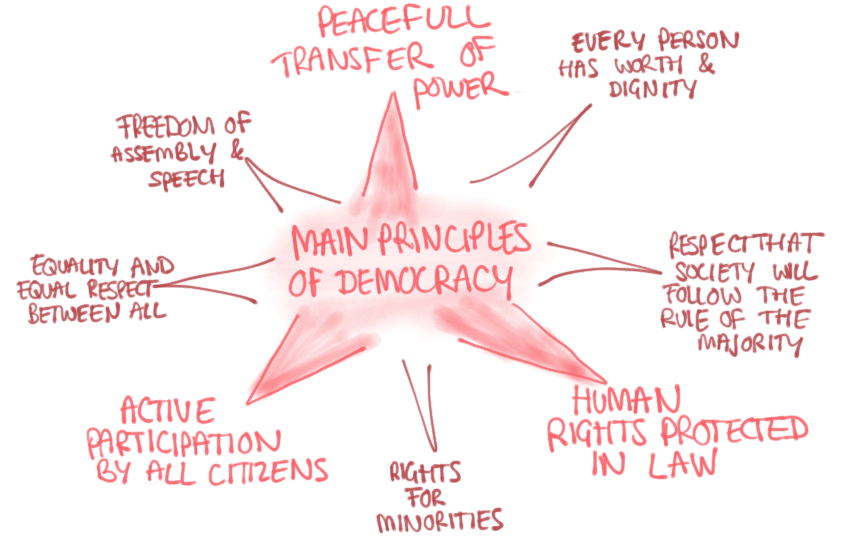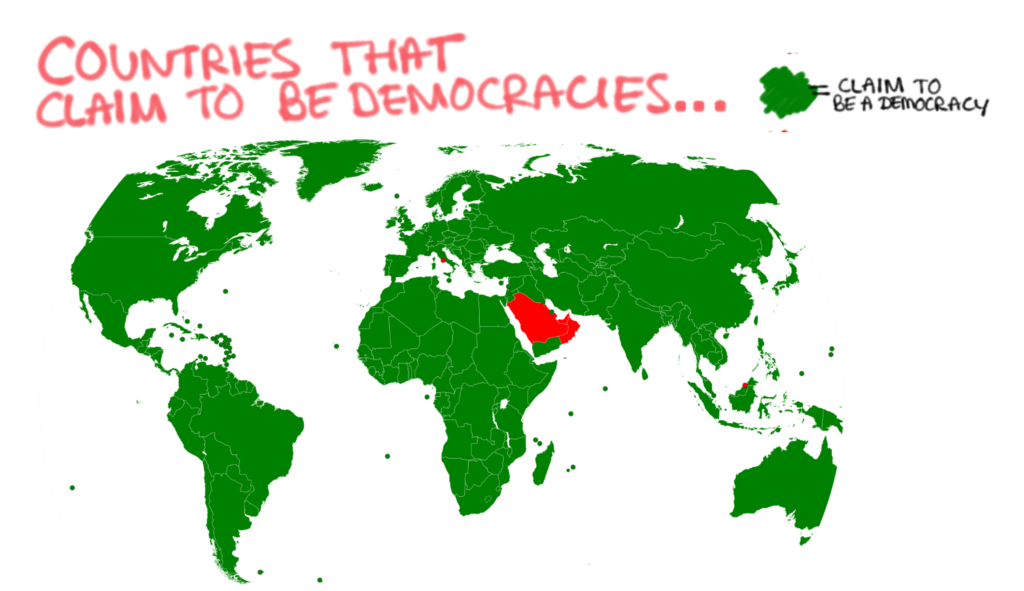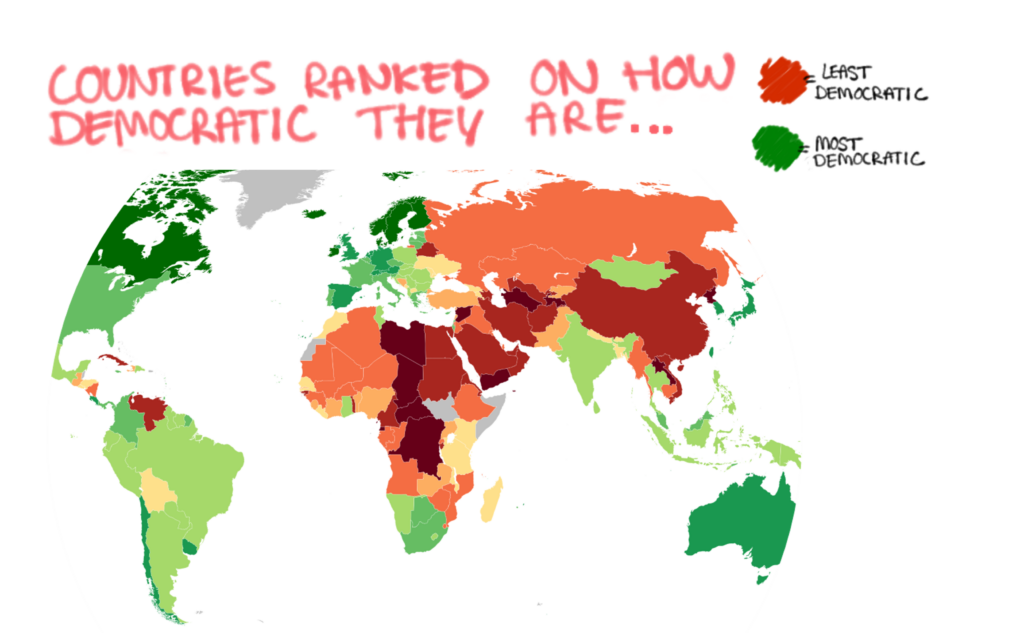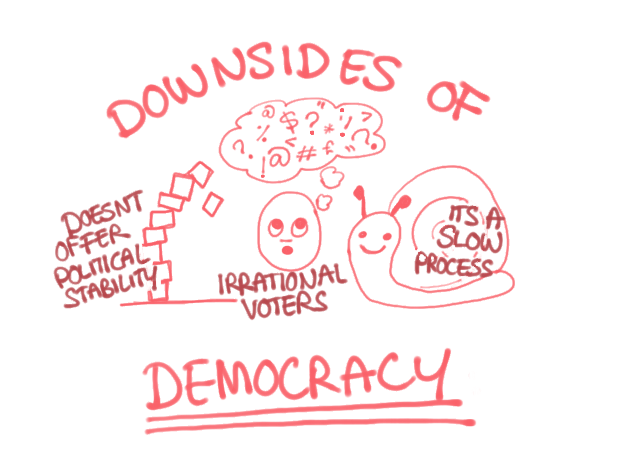What is a democracy?
Democracy is a system for how society can be run. In a democracy, everyone in that society has a say in how the society functions and who it’s run by. A liberal democracy also provides basic human right such as freedom of speech and fair trial by law.
Democracies contrast with other systems for example monarchy (where a king or queen has all the say) or a dictatorship (where there is someone who takes control and defends their control with military).
This post will give you the broad basics, covering the key principles of democracy by answering these questions: ‘is democracy good?’, ‘is democracy fair?’ and ‘What are the downsides of democracy?’
What are the main principles of democracy?
There are some features that are core to the concept of democracy (even though the word ‘democracy’ actually isn’t very tightly defined. Here are 3 main principles of democracy (as from Larry diamond who has published cornerstone pieces on modern democracies):
- Government should be chosen and replaced peacefully through free and fair elections
- There should be active participation of all citizens
- Human rights of all citizens should be protected in law
By googling the main principles of democracy and reading abour for a while there are a few other principles that feature in many definitions:
- Everyone person in the society has worth and dignity
- Equality and equal respect between all of society
- Rights for minorities
- Respect that the society will follow the rule of the majority of the people
- Freedom of assembly and speech

What are different types of democracy?
There are two types of democracy, representative democracy and direct democracy.
In a direct democracy each citizen would vote on each matter of law. In a representative democracy, you have the right to elect someone who represents you (such as a member of parliament in the UK) and that person will decide on the nitty gritty details of the laws. The UK is representative, as is America and most of Europe. Switzerland is a form of direct democracy. Citizens get forms in the post with details of legislation which they can directly vote on.
Is democracy fair?
This is a complicated question because the system, in theory, is fairer that many ways of rule. However, because it’s not tightly defined there are a lot of places that identify as democracies, and some are less fair than others.
There will be some balance when running a country- the quickest way to make decisions and change legislation is always for one person to make a call. But that’s not ‘fair’ if that person is unelected by the people. The ‘fairest’ way might be for every single citizen to vote on every single matter or debate each detail until they all agree on the outcome. This, however, isn’t necessarily practical. It will take a long time and the average person is not even necessarily knowledgeable enough to make a decision on every single matter. So there will always be some sort of trade off. Also, the system by which you vote can have different levels of fairness. That is the topic for another post!
When I was researching for this post I saw the most amazing world maps form the economist which I’m pasting here. The majority of countries in the world call themselves democracies but wow the level of ‘democracy’ in some of these democracies is shockingly low.


What are the downsides of democracy?
There are three main downsides of democracies:
- The irrational voter
- Slows process
- Doesn’t offer much political stability
Any system will have positives and negatives. Being aware of the downsides of a system is essential to making it work in the best possible way. And there are so many different ways to organise democracies, that sometimes these three factors are more of a problem and sometimes less.

Firstly, the problem of the irrational voter:
Not all people will fully engaged and informed on a complex political matter. In a democracy, the vote of someone who randomly crosses a box on a sheet has the same value as a vote by someone who is an expert in the field being discussed. Many philosophers over the years have had something to say about this (often along the lines of only allowing votes to certain citizens). Socrates thought that only those with ‘thought’ should vote. He believed that without a mass population of educated people, democracy would become populism. In other words, it would be a popularity context between the people campaigning for votes on their issues, rather than an educated decision on the merits of the issue in question.
Secondly, democratic processes are slow:
It’s not necessarily a problem but it can be considered a drawback. There is a lot of debate, and the consultations and decision process takes time. The ‘fairer’ the process ie the more say individual people have, the longer it takes. There are ways to make them faster, but ultimately the processes take time and resource. It also means if a snap decision does ever need making, consultation could use up valuable time. Recently during the covid-19pademic, authoritarian states like China were able to make decisions and changes much faster. The authoritarian state also more strongly enforces rules, ultimately leading to a much better containment of the virus. (Not promoting Chinese state, just drawing a comparison).
Thirdly, instability/insecurity:
The third main issue is that constant susceptibility to change can create environmental without enough political stability for big, long-term policies and investments decisions. Business and immigration, for example, are two areas that need long term planning and assured stability. If the government have to campaign for re-election every 5 years, they can’t make much of a plan beyond that. Often when a new government come in, they reverse some aspects of those previously in power. When there are big swings in political trends, investors might be less inclined to invest because of the uncertainty.
Is democracy good?
Democracy is so important and most democracies are immensely proud of their systems and how they govern. Democracy allows for free expression of political interest and free debate and peaceful change of direction when the opinion behind running changes. You might hear Americans, for example, patriotically referring to their country as ‘greatest democracy in the world’.
Most democracies in the world have some features (like voting) that demonstrate role citizens play in choosing how the country runs. Other features, in western democracies relate to philosophical ideals. Foe example freedom of speech and the right to a fair trial. These are so great, it’s really exciting to think that as humans we have organised ourselves into these complex systems. We are to trying to include everyone and give equal worth and value to each persons opinion. Most of us want to live peacefully and with dignity. Most of want to feel positive and proud of the contributions we make to society.
Feeling valued and respected leads to constructive relationships between different groups in societies. It creates an environment where different groups within the society can work together, not fight each other. It’s not always perfect- but it’s a brilliant mission.
However…
There are democracies where in the world where people have some sort of say but not automatic right to free speech and fair trial by law. Democracy is a good thing- but it doesn’t mean that within a democracy bad things don’t happen.
You’d logically want to government in a way that everyone feels listened to because groups within a society who feel un-listened to might otherwise revolt. In some ways this is what has been happening as populism has been rising. Luckily in liberal democracies, these protest are usually peaceful as dissatisfied group have the right (in a democracy) to express their feelings and protest.
But sometimes these dissatisfied people aren’t’ peaceful and they cause disruption and unrest (it happens to the left and to the right of the political spectrum). The populist storming of the US capital under direction of a sitting president is the complete opposite of how a democracy should run. It means the democracy in the US wasn’t working as it should. And the system of how a democracy works can be tweaked.
Conclusion
Democracy is the system we live under which allows us a say in the political decisions of a country and, in a liberal democracy, provides basic human right such as freedom of speech and fair trial by law. There are many different ways to create the system of democracy. Some are more ‘fair’ than others. Some societies in the world identify as democratic (since the definition is not tight) but actually are very unfair societies. The systems of democracy can be ‘direct’ democracy (everyone person has a say in everything) or ‘representative’ where every person has a say in who makes decision on their behalf. The way you are represented also has different level of fairness; actual voting systems may be the topic for another post!
Thanks for reading!
We are creating a community to engage in understanding the systems in our world and working towards a fairer, kinder, sustainable future. Join our monthly mailing list to become part of it and hear about what’s been published on the site and what is going on at Leg Up Understanding.
We have more posts about politics here that might interest you, or check out our posts on society here.
Image attributes:
[1] By Cflm001 (talk) – Own work. This file was derived from:Democracy claims 2.PNGBlankMap-World6.svgby User:Aridd and w:en:User:Canuckguy on 2008-04-06 and 2006-11-12 respectively. Former released under {{PD-self}} and latter under {{PD-self}}, Public Domain, https://commons.wikimedia.org/w/index.php?curid=6685220By Cflm001 (talk) – Own work. This file was derived from:Democracy claims 2.PNGBlankMap-World6.svgby User:Aridd and w:en:User:Canuckguy on 2008-04-06 and 2006-11-12 respectively. Former released under {{PD-self}} and latter under {{PD-self}}, Public Domain, https://commons.wikimedia.org/w/index.php?curid=6685220

